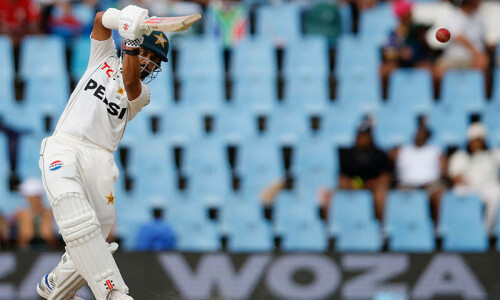
PORT-AU-PRINCE: Clashes between political factions left two dead in Haiti as growing violence and a raging cholera epidemic raised fears Tuesday of wider unrest ahead of key post-quake elections.
The victims were shot dead late Monday in Beaumont, a small town in southwestern Haiti, after supporters of leading candidates Jude Celestin and Charles Henri Baker squared off armed with firearms, rocks and bottles.
Haiti, already ravaged by a catastrophic earthquake in January, is also battling a spiraling cholera epidemic that has killed 1,415 people, among more than 56,000 cases, including 25,000 who required treatment in hospital.
UN health officials warned that the death toll was likely underestimated, and that the impoverished nation could see up to 200,000 cholera cases in the next three months and 400,000 over the next year.
“Cholera is virtually everywhere in the country,” said Jon Kim Andrus, deputy director of the Pan American Health Organization.
Human rights groups led the calls Tuesday to delay the vote in light of the outbreak of the highly infectious disease.
“Cholera is a game changer in the most fundamental sense. It is an immediate and critical crisis that requires all hands on deck in response,” said Melinda Miles, executive director of the group “Let Haiti Live.”
“What we can say, definitively, is that... no elections held in the midst of the current exploding cholera crisis can be considered credible.”
Nearly 4.7 million Haitians are eligible to vote in Sunday's elections, which will also see 11 of the country’s 30 senators and all 99 parliamentary deputies chosen.
Haiti’s next president faces the daunting task of rebuilding a traumatized nation of 10 million that was already the poorest in the Americas before the earthquake flattened much of Port-au-Prince and claimed 250,000 lives.
Fear has grown that the disease could spread more quickly in an election environment when people have to move around and congregate to campaign.
But one prominent candidate, former prime minister Jacques-Edouard Alexis, insisted that the elections must go ahead as planned to ensure that Preval leaves office as scheduled on February 7.
“People should go out and vote,” he said at a press conference in Port-au-Prince Monday. The US ambassador to Haiti, Kenneth Merten, also urged no delay with the polls, telling a video conference call Tuesday that issues surrounding the disease and the election can be avoided “as long as people are informed... of how they can protect themselves from cholera and what treatment to seek.”
Billions of dollars of international aid money could be squandered if no credible government emerges to replace Preval, who was himself under fire for his management of the cholera outbreak.
The run-up to the elections has been further complicated by anti-UN riots in several regions, particularly in the north where aid agencies complain their cholera response is being badly hampered.
UN peacekeepers from Nepal are accused of bringing cholera into the country -- the epidemic erupted suspiciously near their base in the central Artibonite River valley and many Haitians are convinced they are to blame.
Troops with MINUSTAH, as the UN mission in Haiti is known, last week fired tear gas on crowds in running clashes that lasted several hours in Port-au-Prince, after days of rioting that left at least three people dead in northern Cap-Haitien.
Port-au-Prince had been seen as particularly at risk of widespread infection because of the crowded and unsanitary conditions endured by those living in the squalid, makeshift tent cities.
But fewer than 80 deaths have been recorded so far in the capital and the humanitarian group Doctors Without Borders (MSF), which has taken a lead role in treating the disease there, says the situation in the city is stabilizing.
Fear of catching the ailment, which can rapidly lead to diarrhea and dehydration if untreated, has led Haitians to alter their daily habits, including their mundane daily greetings.
Now rather than shaking hands, acquaintances are offering one another “fist bumps,” making gentle knuckle-to-knuckle rather than palm-to-palm contact, in hopes of minimizing the likelihood of spreading germs.
Four isolated cholera cases have been found in the neighboring Dominican Republic and two in the southern US state of Florida.
Senior UN officials have meanwhile expressed disappointment with the international response to its appeal for 164 million dollars to help Haiti combat the epidemic. — AFP














































Dear visitor, the comments section is undergoing an overhaul and will return soon.